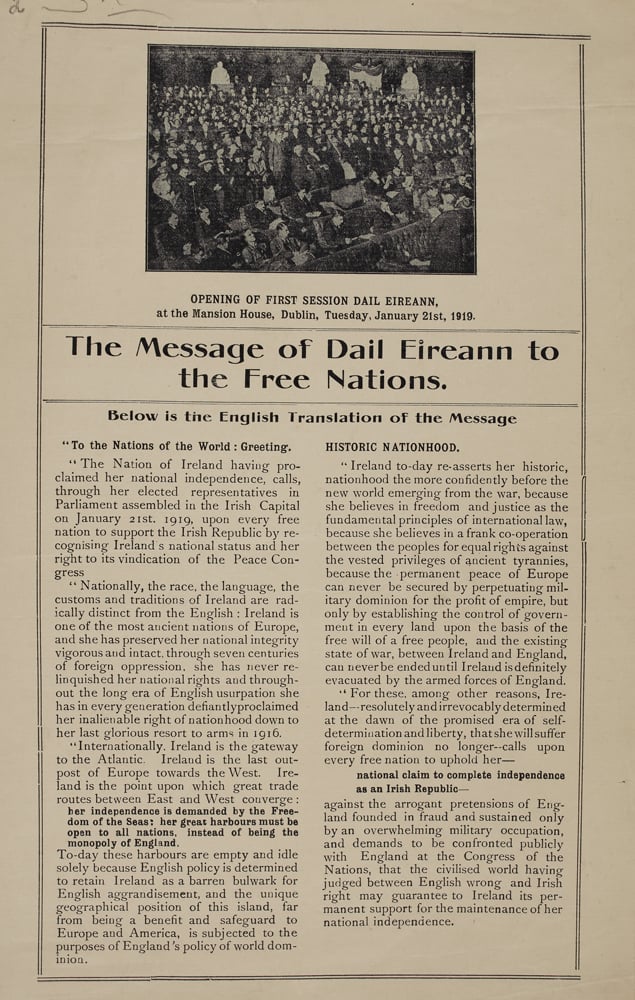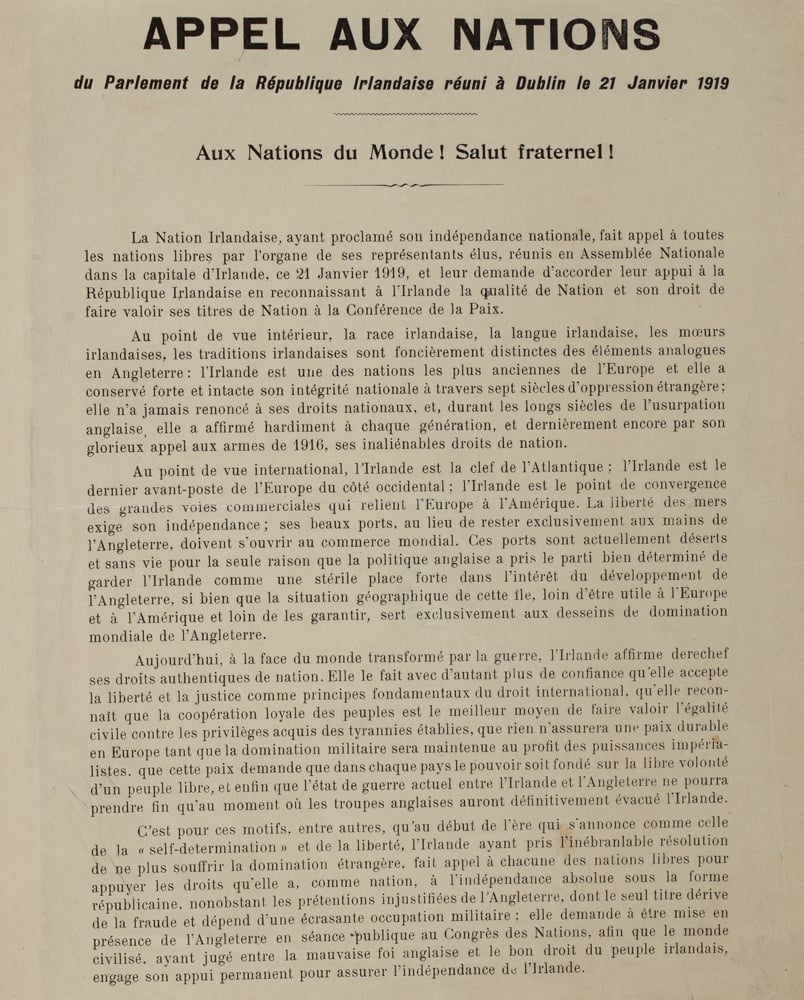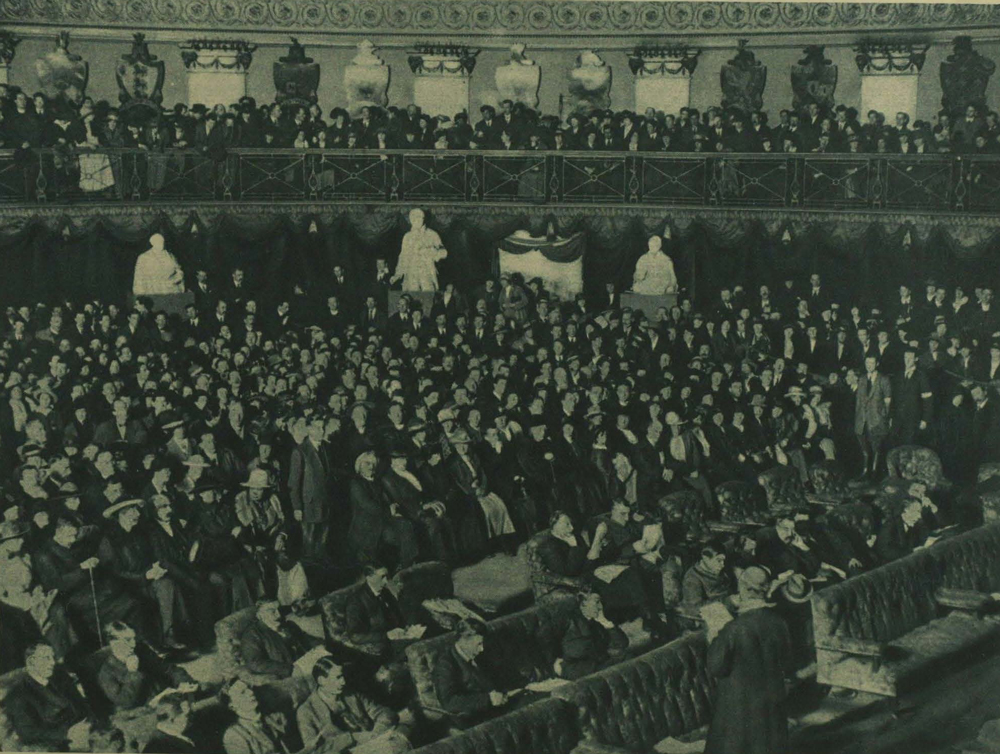Dáil Éireann meets in Mansion House
Dublin, 23 January 1919 - Ireland has been declared an independent republic again. A declaration of Irish Independence was adopted following the opening of Dáil Éireann as a new Irish parliament in the Round Room of Dublin’s Mansion House two days ago.
29 recently elected MPs were recorded as attending.
A roll-call was read out of all those who had been invited. When the names of Sinn Féin members who were in prison were read out the answer, given in Irish, was ‘In Jail’. The room filled with laughter when the name of Edward Carson was read out.
The six members of the Irish Party who were invited neither replied nor attended.
Prof Fearghal McGarry explains the international dimension of the first Dáil.
The opening of proceedings
The audience in the Round Room rose in acclaim for the members of
the Dáil as they walked into the room shortly before 3.30
pm. Many waved tricolour flags and handkerchiefs.
The Lord Mayor of Dublin was in attendance as were several ‘colonial soldiers’, among them a Australian officer in khaki. Great enthusiasm accompanied the entrance of two American naval officers into building, the men responding by smiling and saluting to the crowd.
The proceedings commenced with a prayer delivered by Fr Michael O’Flanagan, acting president of Sinn Féin, following which Cathal Brugha was appointed speaker and four others appointed as clerks.
Much of the main business of the assembly was conducted through the Irish language.
A declaration of Irish independence was read in Irish, English and French and was subsequently adopted. The declaration made reference to the rising of Easter 1916 and to the democratic mandate achieved at last month’s general election:
Now, therefore, we, the elected Representatives of the ancient Irish people in National Parliament assembled, do, in the name of the Irish nation, ratify the establishment of the Irish Republic and pledge ourselves and our people to make this declaration effective by every means at our command:
We ordain that the elected Representatives of the Irish people alone have power to make laws binding on the people of Ireland, and that the Irish Parliament is the only Parliament to which that people will give its allegiance:
We solemnly declare foreign government in Ireland to be an invasion of our national right which we will never tolerate, and we demand the evacuation of our country by the English Garrison:
We claim for our national independence the recognition and support of every free nation in the world, and we proclaim that independence to be a condition precedent to international peace hereafter.
J.J. Kelly (Sceilg), the MP for Louth then read a message to the free nations of the world, a French translation of which was read by Count Plunkett.
This message declared Ireland to be ‘one of the most ancient nations in Europe’ and asserted its right to self-determination ‘before the new world emerging from the War, because she believes in freedom and justice as the fundamental principles of international law’. The message concluded by calling ‘upon every free nation to uphold her national claim to complete independence as an Irish Republic against the arrogant pretensions of England founded in fraud and sustained only by an overwhelming military occupation, and demands to be confronted publicly with England at the Congress of the Nations, in order that the civilised world having judged between English wrong and Irish right may guarantee to Ireland its permanent support for the maintenance of her national independence.’

|

|
Left: Message from Dáil Éireann to the world. Right: Ireland's appeal in French. Click images to enlarge. (Images: National Library of Ireland, ILB 300 p 2 & ILB 300 p 2)
Second sitting
Dáil Éireann met yesterday for the second time at
the Mansion House and on this occasion the proceedings were
conducted in private, the doors closed to the public and the
press.
What is known, however, is that the meeting was presided over by Cathal Brugha with 24 members present. The new assembly’s constitution was then read. It asserted the power of Dáil Éireann to legislate for Ireland and conferred full executive powers on ministers, whose names have not yet been made public
It is understood, nevertheless, that Éamon de Valera, currently in prison in England, is to be the first president of the newly-declared Republic.
[Editor's note: This is an article from Century Ireland, a fortnightly online newspaper, written from the perspective of a journalist 100 years ago, based on news reports of the time.]





















